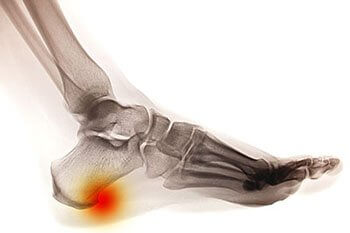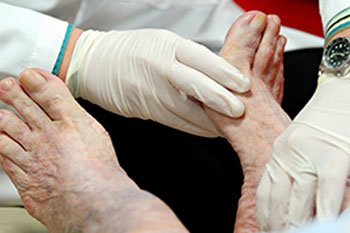Freehold (732) 294-9393
Freehold (732) 294-9393

Located in Freehold, NJ, podiatrist Dr. Henry J. Miller strives to supply patients with quality treatment and care of the foot, ankle, and lower leg. Dr. Miller has served the Monmouth County area since 1993, providing treatment for a variety of podiatric conditions including bunions, corns, calluses, heel pain, and ingrown toenails. He is certified by the American Board of Foot and Ankle Surgery. Also certified by the Council for Medical Education and Testing (CMET) in wound healing, Dr. Miller specializes in diabetic foot care and wound care. The office’s friendly staff welcomes new patients of all ages, promising to deliver a pleasant office visit. The practice aims to work with patients to ensure that they fully understand their conditions and the treatments that best suit them.
Dr. Henry J. Miller accepts a variety of insurance plans. Call (732) 294-9393 to schedule an appointment today!

Signs that may indicate the formation of an ingrown toenail include redness, pain, swelling of the surrounding skin, possible bleeding or oozing of pus, and an overgrowth of the skin around the nail. The surrounding skin may also feel tender and become swollen or hardened. Most ingrown toenails are diagnosed by a simple physical exam; however, an x-ray may be required to show how deep the nail has grown into the skin of the toe.
Many factors influence the likelihood of developing an ingrown toenail. The most common way ingrown toenails are formed is due to an incorrect method in how the toenails are trimmed. If you cut your toenails too short or cut them at an angle, you’re putting yourself at risk of getting this condition. Another main factor that contributes to ingrown toenails is the choice of footwear. Those who commonly wear tightly fitted shoes, such as high heels, that do not give the toes enough room, put too much pressure on the big toes. This can create an ingrown toenail. To alleviate the pain, a small piece of cotton may be fitted underneath the nail. However, in more serious cases, total removal of the nail may be necessary.
For a proper diagnosis and advised treatment plan, we recommend you seek the care of a podiatrist as soon as you notice the warning signs of an ingrown toenail.

Signs that you may have a heel spur include pain felt in the heel region, swelling at the front of the heel, and inflammation. If the affected area also feels warm to the touch, you may be experiencing the symptoms of a heel spur. Heel spurs are extremely uncomfortable and can often lead to a great deal of pain if left untreated. They may develop due to excess body weight, complications with arthritis, wearing poorly fitted shoes, and bruising of the heel.
A heel spur takes the form of a bony-like growth. This is due to a calcium deposit that extends between the heel bone and foot arch. They can grow up to half an inch in length; however, they may not be outwardly visible. Because heel spurs tend to grow, increasing the overall discomfort felt, it’s important that you seek professional help as soon as pain is experienced for early detection.
For a proper diagnosis and recommendations for treatment, we suggest you consult with a podiatrist about any heel pain concerns.

Hammertoes get their name due to the abnormal appearance of the toe, in which it bends down like a hammer. A hammertoe’s shape is formed by a deformed bending in the toe’s middle joint. There are many factors that play into how hammertoes form. Trauma to the toe, such as stubbing, jamming, or breaking it, can make the toe more susceptible to developing into a hammertoe. Age and gender also influence the likelihood of getting a hammertoe. Women have also been known to be more likely to develop a hammertoe compared to men. You’re also more likely to develop this condition as you age. Certain diseases, such as arthritis and diabetes, have been known to influence the likelihood of forming a hammertoe.
Hammertoes can be painful as well as incredibly uncomfortable. To help ease these symptoms, it may be beneficial to wear orthotics. Custom orthotics are used to help realign the toe structure and aid in the process of healing. Certain injections may be recommended by a podiatrist as well to help alleviate the pain. To prevent being afflicted by this condition, it’s recommended that you wear shoes that leave enough room for your toes and continually change your footwear as your feet change in size.
If you’d like more information on hammertoes and how to best treat the condition, we recommend you speak with a podiatrist for professional care and advice.

The feet support and carry your body weight throughout your entire lifetime. Because of this, it’s no wonder that they tend to experience wear and tear as we age. With that being said, it’s important we care for our feet on a daily basis; it’s especially important, however, that we care for our feet into old age, when they are more prone to developing certain conditions. Some common foot complications that tend to affect elderly patients include bunions, changes in the overall foot structure, arthritis, fungal or ingrown toenails, and general foot pain or soreness.
As we age, our feet tend to grow in size. If you’re not regularly changing your footwear to properly and comfortably fit the size of your feet, and in turn, are constricting your toes, it’s likely you may develop a bunion or hammertoe. These conditions can be incredibly uncomfortable and may cause a great deal of pain if not properly treated by a podiatrist. Caring for our feet can become more difficult as we age. In order to help avoid incorrectly cutting the toenails, it’s advised that you seek the care of a podiatrist who can trim your toes straight across, preventing the formation of an ingrown toenail. The older we get, the more our chances of having arthritis increases. Arthritis tends to be the cause of foot pain, as well as stiffness, and can even lead to the development of the foot conditions listed above. Patients have found relief from the discomfort caused by arthritis by wearing custom orthotics, as well as including light stretches in their daily routine.
For more information and tips on maintaining proper health for geriatric feet, we recommend you consult with a podiatrist for professional care and guidance.
1000 West Main Street
Freehold, NJ 07728
(732) 294-9393
| Mon: | 9:00 am - 12:00 pm |
| Tues: | 2:00 pm - 6:00 pm |
| Wed: | 9:00 am - 12:00 pm |
| Thur: | 2:00 pm - 6:00 pm |
| Fri: | 9:00 am - 12:00 pm |
| Sat: | By Appointment Only |